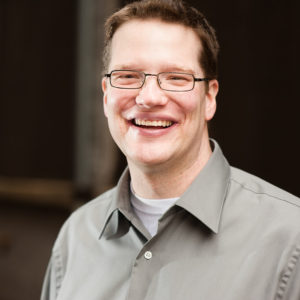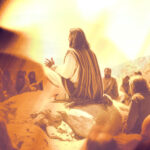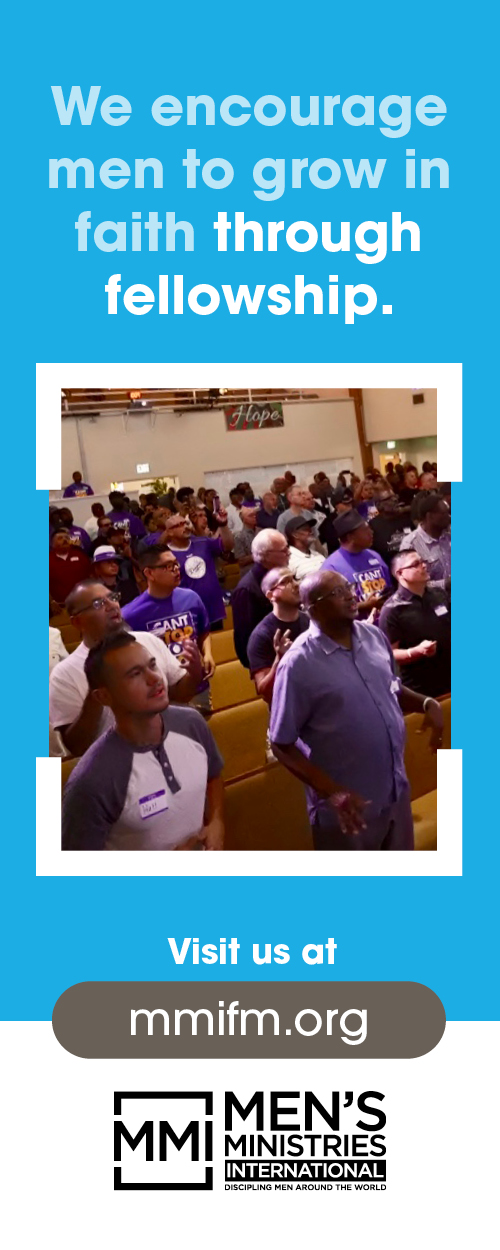A Light+Life Podcast
With guests Chris Pulice & JR Rushik
Hosted by Brett Heintzman

Jeff Finley
Light + Life Executive Editor
Jeff Finley is this magazine’s executive editor. He joined the Light+Life team in 2011 after a dozen years of reporting and editing for Sun-Times Media. He is a member of John Wesley Free Methodist Church where his wife, Jen, serves as the lead pastor.
by Jeff Finley
Some church planters and ministry networks avoid the word church, but not the Church Development Network.
“While we’re all for a lot of forms of ministry, we’re not out starting ‘missional communities.’ We’re not out starting this ministry or that. We plant churches because the local church is the hope of the world. Jesus said, ‘I will build my church,’” said Chris Pulice, the network’s church planting facilitator, in a new episode of “The Light + Life Podcast” hosted by Brett Heintzman. “There’s a spiritual authority, a kingdom authority, that comes when you’re starting a church in Jesus’ name.”
J.R. Rushik, the network’s director of strategic alignment, also participated in the podcast and noted that the network’s leaders “celebrate anything that’s for the kingdom of God that’s started, but for us, we want to be laser-focused on saying, ‘We’re going to start the thing that Jesus established, and He promises to build.’”
Some planting networks only will start one type of church, but that’s not the case with the Church Development Network (CDN).
“We refuse to put a qualifier in front of the word church. We’re not starting ‘house churches,’ or ‘legacy churches,’ or ‘micro churches,’ or ‘macro churches,’ or ‘simple churches,’” Pulice said. “It’s just churches.”
_
“Everything we do is about planting the church that Jesus is calling you to plant.”
_
“Like snowflakes, no two church planters are the same,” Pulice said. “We don’t want to put a ceiling on what’s too high or too small on anybody. It’s really freeing. We’re not against large or small churches or anything in between. The body of Christ is diverse.”
Rushik said the network is “looking to connect with likeminded people that have a desire to see churches planted in creative spaces and places in your local community and around the world.”
Pulice said that “everything we do is about planting the church that Jesus is calling you to plant, and that just so happens to be the exact church your community needs.”
The focus is on planting churches rather than planting one church.
“We inject the DNA of multiplication at the very beginning,” Pulice said. “All living things reproduce.”
Each local church plays an important part, but it can be confusing these days to understand what a local church is in the midst of innovative church planting.
“We define a local church with the three Cs: covenant, characteristics and charismata,” Pulice said.
In the covenant, the people understand they’re a local body of believers. The Church Circle tool helps the CDN participants understand common New Testament characteristics of churches — such as Communion, baptisms, giving, preaching and worship — amid different cultural expressions. Pulice defined charismata as “simply the gifts of the Holy Spirit. Actually, the presence of the Holy Spirit is what distinguishes the true bride of Christ from any other group.”
Encounter Experience
The network offers Encounter, a weekend experience followed by focused training and mentorship.
“The goal of an Encounter weekend — while there’s really good content — is that we want to bring people to a place where they’re hearing the voice of God and responding to the invitation of the Holy Spirit to acknowledge their identity as a church planter,” Rushik said. “We go to great lengths to celebrate when someone is able to raise their hand and say, ‘God’s called me to plant a church.’”
Rushik added that “we’re careful not to prescribe forms for the structure of the church. What we want to do is create an environment for potential church planters to hear from God and for them to respond to that call.”
_
“You’re asking God, ‘Who do You want in this room?”
_
The CDN draws inspiration from its Free Methodist heritage in which church societies quickly formed.
“When I think of the history of the Free Methodist Church, the early days when there were revival meetings, the power of God would show up,” Rushik said. “There was someone there that said, ‘God’s called me,’ and a spiritual reality took hold, and then a new place of ministry was birthed.”
For an Encounter weekend to take place, the CDN needs a host with a vision of a church planting movement in the region where the Encounter will be held.
“Sometimes it’s a superintendent. Sometimes it’s a local church pastor,” said Rushik, who added the host is responsible for inviting other people. “Ultimately, you’re praying. You’re asking God, ‘Who do You want in this room?’”
Invited people would ideally be wrestling with a call to plant churches even if they can’t clearly articulate that call.
“The weekend is broken into four blocks with eight sessions, and each session brings you to these defining moments,” Rushik said. “In particular, the first block lands after talking about God’s call and vision where you begin to just dream about what God could do in a region if there was a multiplication of churches taking place.”
After the Encounter
A Zoom call is held each month for everyone in the CDN who is called to plant, but training also takes place on the local level. The Encounter host develops into a trainer who mentors and coaches local church planters on their journey.
Rushik said mentoring includes caring about who the planters are becoming and “teaching them the spiritual disciplines, particularly time in prayer, listening to the voice of God, all the spiritual formation that needs to take place.”
The coaching aspect shares objectives that the trainer wants the planter to meet so the church could be born within 90 days. The objectives were developed by Theo Burakeye, who worked for the CDN and the Acts 12:24 Churches before his Dec. 21, 2021, death following a battle with cancer.
“Theo [previously] led a church planting movement throughout Africa, planted 75,000 churches in 33 countries, and we sat down with him many times and just said, ‘Hey, tell us what really happened,’” Rushik said. “We’ve really taken a lot of what works in a multiplication movement that was highly fruitful and successful, and we’ve contextualized it to something that works in the West.”
Beginning With Prayer
The network’s church planters begin with a series of prayers.
“The first prayer is, ‘Lord, teach me to pray,’” Rushik said. “Pray like Jesus prayed. It’s the master key for a move of the kingdom of God.”
Other prayers include seeking direction for where to plant churches, whom to reach, and which people should serve as the planter’s prayer shield.
Simple and Unpredictable
Successful church plants can have simple origins.
“We just had a church in Virginia that is very fruitful, grew out of their living room, and now they’re renting from a YMCA, and they’re on a path to break the 200 barrier,” Rushik said. “Others might stay in a smaller space for some time, but whatever God wants for that church is present in the people that you reach.”
_
“How do you hear from the Lord, as it pertains to you as a church planter, and obey Him?”
_
The network’s website says the CDN values an “unpredictable pathway with predictable steps.” Pulice explained that phrase came from Steve Smith, the author of “Spirit Walk: The Extraordinary Power of Acts for Ordinary People.”
“The unpredictable pathway is planting churches,” said Pulice, who recalled that Burakeye would tell him and Rushik, “The details are in the journey.”
Although the CDN helps with project management, Pulice said, project management is “not the main thing. The main thing is: How do you hear from the Lord, as it pertains to you as a church planter, and obey Him?”
Unlikely Church Plants
Rushik said that one CDN planter mentioned to Burakeye that other kids were hanging out in his driveway skateboarding with his children and using ramps he built for them. The planter considered starting a Bible study for parents waiting on the kids, Rushik recalled, but “Theo said, ‘No, you need to plant a church.’”
“He planted a church in his driveway. It moved to his living room. It moved to his garage, and soon it outgrew his garage,” Rushik said. “Someone down the street in town said, ‘Hey, we have an outreach ministry, but we don’t use the building on the weekends. Do you want a space for your church? So they were given a free building.”
The city government invited the church to build a skatepark in a city park. While continuing as the pastor and leading others to Christ, the planter brought other pastors from his community to an Encounter weekend.
“God began to stir in his heart to not just be a church planter but to be a trainer. So then as part of our trainer-training process, he came to another Encounter weekend, and he co-led it with us,” said Rushik, who added the man recently “held his own Encounter weekend, and as a result of that, five different people responded to God’s call to plant churches.”
The man is now actively mentoring three people who plan to launch their churches this summer or fall.
A Maryland pastor who attended an Encounter weekend in New Jersey was struck by CDN’s emphases on rapid deployment and that a new church can form with two or three people gathering (Matthew 18:20). The pastor realized he could help someone else start a church in a new location. He called a woman named Ivy whom he previously didn’t see as a church planter.
“Under his mentorship, Ivy started a church in her shed, and it’s still meeting and growing and thriving,” Pulice said. “Ivy came to an Encounter weekend we just had in Washington, D.C., totally affirmed in her calling, and left Encounter weekend with the names of three other potential church planters she’s going to vision-cast to and help start churches.”
Other participants also have reported that they did not think they knew anyone who could plant a church until they attended an Encounter weekend.
“This is a ministry that generates church planters,” Pulice said. “It’s Acts 4:13 — unschooled, everyday, ordinary people. It’s not the one who’s going to hit a homerun on the assessment. It’s the 99 other people who might do something for Jesus.”
Rushik shared about a school bus driver who attended an Encounter weekend in the Boston area because her pastor invited her. She returned home and invited 15 unsaved friends “who had never gone to her church and never would go to her church” and told them, “Hey, I’m starting something new. Would you like to come?” Within a few weeks, three people gave their lives to Christ, and the bus driver/church planter held her first baptism service in the lobby of her Free Methodist church with the support of her pastor.
Although ordination isn’t necessary to start a church, Rushik emphasized that the CDN leaders “really do want to honor the integrity of the church and the process of ordination. It’s an important journey.”
New churches eventually raise up pastors who are called to become ordained elders. Rushik said the CDN is commissioning planters who will “hear from God” and “go immediately, and then we’ll work on that process of spiritual formation, of credentialing or certification.”
CDN Connection
The Church Development Network has a vision of starting 1,000 churches.
“Our mission is a relentless pursuit of obedient disciples,” Rushik said. “The number one thing we’re after is seeing disciples of Jesus make disciples of Jesus, and we feel like if we can get activated on that mission, the church planting piece is all a fruit of that.”
Visit churchdevelopment.network to connect and learn more, or follow the CDN on Facebook and Instagram. Click here to email Pulice, and click here to email Rushik.
“We’d love to talk to anybody that’s interested in seeing a movement of churches planted in their region,” Rushik said. +

Jeff Finley
Light + Life Executive Editor
Jeff Finley is this magazine’s executive editor. He joined the Light+Life team in 2011 after a dozen years of reporting and editing for Sun-Times Media. He is a member of John Wesley Free Methodist Church where his wife, Jen, serves as the lead pastor.









